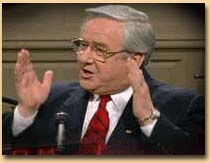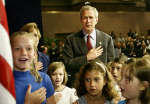1. What Historical Transition Means
1-1. Religion as the earliest "Information Business"
I remember the three elements that divide human beings from animals
that I learned in elementary school. They are that human beings a)
are bipedal, b) make and use tools, c) have a language system. However,
these characteristics supposedly peculiar to humankind were soon found
not to be so. Penguins also walk on two legs, manlike apes build devices
and make use of them ingeniously, moreover, it is reported that there
is "a clever monkey" who can buy a can from a vending machine
with coins. In addition to tool-using apes, a certain kind of finch,
catches ants to eat with a "fishing rod" made from a branch
adjusted for length and girth. And, regarding language, the uniqueness
of humans is also unquestionable. There is no need to cite here the
examples of whales or dolphins, who communicate with each other orally.

Ape and Human
|
If it is not these three elements, then what on earth does divide
humankind from other animals? My answer to this question is that it
is undoubtedly religious passion. In the process of evolution from
apes, humankind acquired a lot of cerebral cortex, so much that it
can even be said to be "too much". The cerebral cortex contributed
to making human beings "the lords of creation." At the same
time, it produced a side effect, imagination, which gives us both
overestimates and underestimates as well as life-sized estimations
of the phenomena in front of us. That means that the establishment
of a persecution complex, religious passion, and artistic sentiment
come with the birth of humankind. Thus the existence of human and
religion cannot be separated.
It was the "person of religion" such as the shaman or
priest in every culture around the world, who was independent, as
the earliest "business" in "primitive" hunting-and-gathering
societies, when all the people were self-sufficient and before people
had specialized jobs. So it's not an exaggeration to say "religion
is the earliest information business."
1-2. Four "twos"
When we review human history we use various periodizations depending
on our purpose. Here I'd like to propose four "twos" for
this session on "Information Technology." They are 2 million
years, 2 thousand years, 2 hundred years, and 2 decades.
First, a) 2 million years ago, Homo Habilis and Homo Erectus diverged
from Australopithecus, the first ape-man originated in Eastern Africa.
It's imagined that religious passion, such as fear of the supernatural
or dedicating things to the dead was developed in this period when
brain cortex was acquired rapidly. Then b) 2 thousand years ago, soon
after the Iron Age started and large scale war became possible, many
founders of what we now call "religion" took an important
role.
Then c) 2 hundred years ago, human society evolved by leaps and
bounds from tyranny and farming society to the Industrial Revolution
and civil society. It meant also the constitution of the "modern"
nation state. We should pay attention to the fact that this system
of modern society established the "monster" of capitalism,
combined with the biological character of the human brain cortex such
that it is not able to see objects in life size. In consequence, "religion"
was pushed away to the periphery of society, even though it had been
the basis of value systems for the last 2,000 years.
Finally d) about 20 years ago, the "post modern or post cold
war" society began, in which we, ourselves, live in the present.
This era can be named in one word, "globalizing society,"
considering the spread of computers, communication satellites, and
sophisticated telecommunication technology such as the internet. Many
of the "negative heritages of modern society" have been
destroyed by the liquidation of people, material, money, and information
all over the world by globalization. At the same time a lot of "monsters"
were created, such as nationalism in the political world and fundamentalism
in the religious world.
Considering the above, the purpose of this article is to ask ourselves
how to become aware of the present situation, what to do about it,
and what can be done about it.
2. The Role of the Media for Religion
2-1. The Sophistication of the Media Changes the Cultural Accomplishment
One of the misunderstandings we often tend to be captured in when
considering religion is that "it's hard to change the dogma,
the essence of the founder's teachings on which a religion bases itself
by ostensible reason." However, dogma can be dramatically changed
through sophisticated use of the media.

Gutenberg's Bible |
The most famous example is the "Reformation" of Martin
Luther. The prior invention of the printing press by Johannes Gutenberg
was needed for the Reformation in 1517 to occur, a movement which
denied elements of the traditional theology, such as the superiority
of Pope, which had been believed for more than 1,000 years. It adopted
a reformed theology said to be based on "Sola Scriputurum."
Without the invention and spread of the printing press, most people
would not have had a Bible, and Luther's theology would not have been
possible. This means that the spread of a medium, the printing press,
was a cause of Protestant theology.
The 20th century also saw a similar situation, one which we have
all experiences,--the spread of television, which is characterized
by the fact that a lot of people, millions or billions people around
the world, can concurrently watch an incident live on TV, and by the
creation of televangelists, typically in the US. Most new religions
that developed rapidly after World War II more or less have some of
this.

a Televangelist |
It is a simplifying or extreme of doctrine. Because television is
not suitable for complex thinking typical programs are such things
as quiz shows on which someone acquires a cash award by answering
alternatively 'true' or 'false.' It's very different from a Zen Buddhist's
koan that requires deep inner understand. It's easy to define various
phenomena grossly in good and evil terms and then broadcast them.
From the fact that many religious and political leaders take such
fundamentalist stance, you will easily understand how television affects
us adversely. Moreover, this media has the same character as capitalism
in that the larger the market size (=the number of believers), the
more merit it has.
2-2. Is the Internet the Messiah?
The newest emerging media is the information network of personal
computers tied together by the internet. This new media has something
in common with the previous media in that it involves the "synchronicity
of many people over the world." On the other hand, this media
has created a situation in which "a receiver also transmits information,"
although the mass media used a fixed system of one-way communication
from sender to receiver. En passant, I have run a web site named RELNET
(www.relnet.co.jp) for 4 years. Now, despite there being many other
sites run by huge old and new religious organizations, it has grown
to be one of the largest religious information web sites in Japan.
It's required also at churches that the separation of the roles
of professional priest or minister and layman should be insignificant.
All the people should look at themselves with a critical mind, and
learn by communication with others. Our situation has many points
in common with that of 2 million years ago, when humankind acquired
religious passion. Just as they made flint implements to fit each
hand, not the standardized mass industrial production, we are engaged
in creating certain information to send to others on keyboards in
cave-like rooms. It's not an exaggeration to be called Homo Habilis
in the 21st century. Religion can be called precisely the earliest
and latest information business.
3. IT and Religious Freedom
3-1. Courage to Doubt even God
How to tackle the "monsters" of nationalism in the political
world and fundamentalism in the religious world, created in post-modern
society, is an emergency challenge for us in this IT society where
all aspects of life are globalized. Now we gather from all over the
world on the same interesting theme of, "Protecting religious
minority's human rights so called religious freedom." Thus, we
should pay careful attention to the judgment that the San Francisco
Federal Appellate Court returned on the 26th of June saying that "the
phrase 'one nation under God' in the US 'Pledge of Allegiance' is
against the Constitution of the U.S. It is recited in the public primary
and junior high schools. The real problem is members of Federal Government
or Congress who criticize this court ruling. We should pay attention
as well to the suppression of the human rights of non-Muslims in the
Persian Gulf countries and of Tibetan Buddhists or Falun Gong members
in China.

the Pledge of Allegiance in Public School |
3-2. IT Could Be the Essential Arm
Minorities have been discriminated and pushed to the periphery of
society, in some extreme cases, deprived of their lives and assets
in the pre-IT society, as if that was reasonable. Now, the rapid spread
of IT enables these minorities and those who respect minorities to
unite even though they live separated from each other around the world
and could not meet, were it not for the technology. This function
brings us back to the original meaning of the Latin word for religion,
"religio," that is "again" and "bind."
Considering the situation, IT must be the essential tool for our activities.